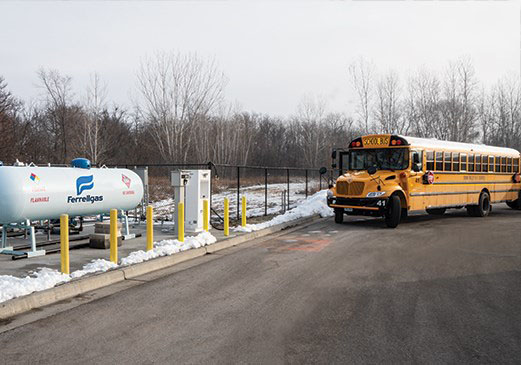3 reasons why school districts are switching to propane autogas
Across the country, school districts are finding ways to innovate the classic school bus. For years, we grew up with large diesel buses known as much for their loud sounds and big exhaust clouds as they were for their bright yellow color. But now, with a renewed push for environmental health and districts aiming to cut transportation costs, it’s no surprise that propane autogas has taken the lead as the alternative fuel of choice to power thousands of fleets. Here are a few reasons why propane is leading the pack for our nation’s school districts.
Propane autogas is environmentally-friendly
The Grain Valley School District in Grain Valley, Missouri, is one district that has made the switch to propane autogas. Among the chief reasons why is propane’s impact on the environment in comparison to diesel. The negative environmental effects of diesel have long been noted, especially in large vehicles like school buses. Known for their large emissions of nitrogen oxides and particulates, diesel engines degrade in performance over time, often causing the engine to become non-compliant with emissions standards. Compare that to clean-burning propane. In real-world testing conducted by West Virginia University in 2018, propane autogas produced 96 percent fewer nitrogen oxide emissions compared with clean diesel buses. Schools also trust propane autogas buses to reduce particulate matter around students, which can irritate asthma and other breathing-related issues.
Converting to autogas saves fleets in fueling and maintenance costs
The environmental benefit of autogas can only be rivaled by its low total cost. For Shawn Brady, Director of Transportation at the Grain Valley School District, savings on both fuel and maintenance made autogas a no-brainer for the district. Currently, Grain Valley is saving about $1.16 per gallon with the fixed pricing offered through Ferrellgas, while removing the volatility commonly seen with traditional “dirty” fuels like diesel. As Brady mentions, “the district’s increased savings year after year will allow the transportation department to serve as a better steward of taxpayer money.” Certainly, this serves as a worthwhile opportunity for all the parties involved in making the decision to convert to autogas.
Over time, the operating costs of diesel buses are coupled with a substantial maintenance cost as well. As Brady explains, “Since the engine (of an autogas bus) is burning a clean fuel, the manufacturers don’t have to add extra technology features to the engine to make the exhaust stream clean.” With less moving parts to worry about over time, there are more buses in operation to get students to and from school and extracurricular activities.
Autogas makes for a more comfortable ride
Among the many reasons Brady and other transportation directors are moving to propane autogas is the comfort it provides both passengers and drivers. In bitterly cold winter temperatures, diesel buses are left idling in order to warm up, oftentimes for an entire night in preparation for the next morning’s commute. With autogas however, buses heat up to the desired temperature within 20-30 minutes. As Brady describes, he “stepped on a bus the other morning that had been idling for a little bit, and it was the hottest bus I’d ever stepped on. I had to open the windows after I turned off the heat just to be able to sit in there and drive down the road to a school to get a kid.” By providing students the most comfortable experience possible, Brady and the Grain Valley district drivers give peace of mind to them and their parents. Chalk that up as another win for propane autogas.
Contact Ferrellgas for your propane autogas needs
More than just school districts rely on Ferrellgas to help them operate their fleet. We have several resources to walk you through the autogas conversion process, beginning with our autogas page. Be sure to watch and listen to one of our customer’s testimonials, and reach out to your local Ferrellgas office to find out how you can make the switch to propane autogas.
CATEGORIES
Archives
- Summer 2025
- Spring 2025
- Winter 2024
- Fall 2024
- Summer 2024
- Spring 2024
- Winter 2023
- Fall 2023
- Summer 2023
- Spring 2023
- Winter 2022
- Fall 2022
- Summer 2022
- Spring 2022
- Winter 2021
- Fall 2021
- Summer 2021
- Spring 2021
- Winter 2020
- Fall 2020
- Summer 2020
- Spring 2020
- Winter 2019
- Fall 2019
- Summer 2019
- Spring 2019
- Winter 2018
- Fall 2018
- Summer 2018
- Spring 2018
- Winter 2017

